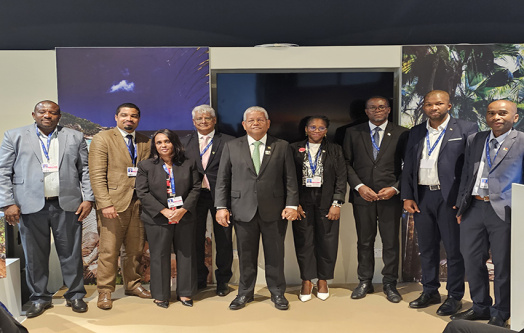
In the midst of the bustling COP28 in Dubai, a significant event unfolded at the Seychelles Pavilion—the Ministerial Dialogue of the African Union Commission (AUC) in partnership with the African Islands States Climate Commission (AISCC). Seychelles as the Chair of this commission organized this gathering to enhance collaboration among African Island nations and chart a strategic course to amplify the visibility and communication efforts of the AISCC.
President of the Republic of Seychelles and Chair of the AISCC, His Excellency President Wavel Ramkalawan, reiterated Seychelles' dedication to leading the commission. He underscored the necessity of reinforcing exchanges to amplify the voices of African Island States at the level of the African Union Commission, Regional Economic Communities, and Regional Organizations. President Wavel Ramkalawan concluded his statement by commending the work of the AISCC and highlighting the importance of extending this platform for the younger generation, ensuring continuity in addressing climate challenges.
Minister Flavien Joubert set the tone for the dialogue with a warm welcome to Ministers, National Focal Points, and Partners from Cabo Verde, Comoros, Equatorial New Guinea, Guinea Bissau, Madagascar, Mauritius, Sao Tome and Principe, and the United Republic of Tanzania. He articulated the primary objective of the meeting which is to provide a platform for direct exchange with the Chair since the official launch in 2020 in Addis Ababa.
Minister Joubert emphasized the importance of fostering direct communication and collaboration to address the unique challenges faced by African island States. He acknowledged the need for strategic direction and cooperation to propel the AISCC's mission forward.
Expressing gratitude, Minister Joubert extended thanks to partners such as 4C Maroc, the United Nations Economic Commission for Africa (UNECA), and the Indian Ocean Commission (IOC) for their support in operationalizing the AISCC. This collaboration underscores the shared commitment to climate resilience in African island nations.
To summarize the event, Ms. Gina Bonne, the Focal Point of the Indian Ocean Commission, provided a brief presentation of a progress report, outlining key achievements. She offered valuable insights into the next steps for developing the AISCC's mandate and strategies for mobilizing funding.
One key proposal discussed was the development of a Memorandum of Understanding (MoU), a soft instrument with no financial implications for states. This MoU would serve as a foundational document for states to collaborate on climate change matters. Importantly, it was clarified that the MoU would not replace or supersede existing arrangements that states may have with other regional organizations or the African Union Commission.
Ms. Bonne also shed light on the communication plan, emphasizing the importance of ensuring the visibility of AISCC. Effective communication is seen as crucial for garnering support, both regionally and internationally, and for raising awareness about the challenges faced by African island States in the context of climate change.
In conclusion, the Ministerial Dialogue at COP28 served as a pivotal moment for the AISCC, reinforcing its commitment to climate resilience in African island nations. The discussions and proposals put forth during this dialogue set the stage for enhanced collaboration, strategic planning, and increased visibility on the global stage, all contributing to a more sustainable and resilient future for the African Islands.
